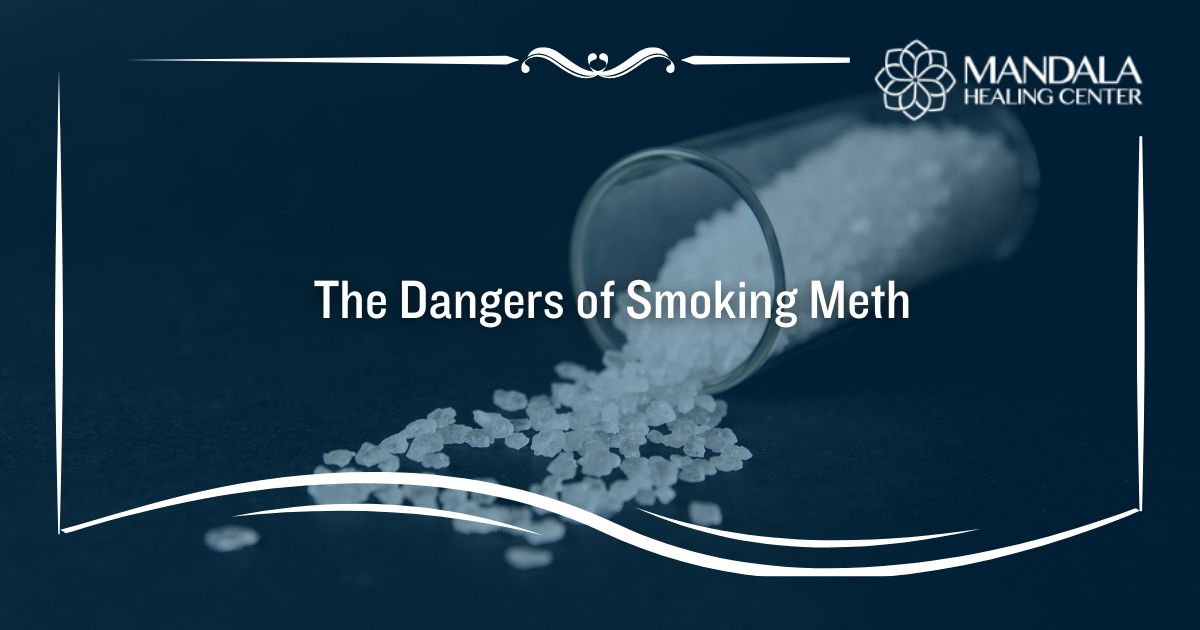Crystal meth is a potent stimulant drug that speeds up your central nervous system. While it is used medicinally to treat attention deficit hyperactivity disorder (ADHD), most people who abuse it are buying it on the street. As a result, the meth they are receiving contains dangerous additives and impurities.
According to the National Institute on Drug Abuse (NIDA), 2.5 million people abuse meth in the United States.[1]
Meth can cause a wide range of mind-altering side effects, including euphoria, increased energy, heightened blood pressure, and weight loss. You can snort, swallow, smoke, or inject meth. No matter how you abuse it, methamphetamine use leads to a laundry list of long-term physical and mental health consequences.
Some people believe that smoking meth is less dangerous than ingesting it. Unfortunately, this is not true. Smoking meth can lead to a variety of risks, including addiction, psychosis, malnutrition, tooth decay, overdose, and cardiovascular risks like heart attacks.[2]
In this article, you will learn:
- What are the effects of meth
- What are the dangers of smoking meth
- How to spot the signs of a meth overdose
What are the Effects of Meth?
As a central nervous system stimulant, meth causes increased energy, heightened focus, and a fast heart rate. You might experience a rush of euphoria when you abuse it. However, you can also deal with adverse effects like anxiety, paranoia, aggressiveness, and even psychosis.
The common effects of meth include:[3]
- A rush of euphoria
- Increased energy and focus
- Fast heart rate and increased blood pressure
- Increased body temperature and sweating
- Dilated pupils
- Anxiety and paranoia
- Anger or impulsivity
- Tremors or twitchy movements
- Lessened need for food and sleep
- Symptoms of psychosis, such as hallucinations and delusions
Abusing meth can lead to a substance use disorder. Consuming it repeatedly increases your risk of addiction. Once you are addicted to meth, you are more likely to abuse it in high doses, putting you at risk of overdosing.
Thankfully, addiction centers can help you recover from meth addiction. If you are struggling with meth abuse contact the Mandala Healing Center to learn more about your treatment options.
What are the Risks of Smoking Meth?
You can abuse meth in just about any way you can imagine. No method of administration is safer than another. Smoking meth is just as dangerous as injecting, snorting, or swallowing it.
The dangers associated with smoking meth include:
Addiction
Meth is a highly addictive substance. Some people report becoming addicted to it after only a couple of uses.
If you suffer from meth addiction, you might have a hard time controlling how much you use. You might also experience cravings to abuse meth and develop a tolerance for it. The most obvious sign of meth addiction is experiencing withdrawal symptoms when you stop using it.
Psychosis
Smoking meth can lead to psychosis.[4] Psychosis is a mental health emergency characterized by a detachment from reality, hallucinations, delusions, and paranoia. Since meth speeds up your central nervous system, it can cause you to experience these symptoms.
Malnutrition
Meth is an appetite suppressant. When you are smoking it, you are not likely to become hungry. If you consume meth frequently, you might find yourself losing a lot of weight rather quickly.
In other words, smoking meth can lead to malnutrition. This is dangerous because malnutrition can lead to the depletion of fat and muscles, reduction in cardiac muscles, gastrointestinal issues, poor immune system function, and psychological effects like depression.[5]
Tooth Decay
Meth causes tooth decay so often that there is a term for it: “meth mouth.” Meth reduces the amount of saliva in your mouth, so the acid in your mouth will break down your enamel.[6] People who are addicted to meth might develop cavities, tooth decay, ulcers, gingivitis, and tooth loss.
Cardiovascular Dangers
Meth can lead to a variety of damage to the heart. First, it speeds up your heart rate and increases your blood pressure. You could also experience arrhythmias.
Other cardiovascular risks of smoking meth include:[7]
- Heart attack and stroke
- Coronary artery disease
- Coronary vasospasm
- Dilated cardiomyopathy
- Pulmonary hypertension
Overdose
Lastly, smoking meth can lead to an overdose. Even though the effects of meth can last for 17 hours, people tend to binge on the drug. You might smoke too much for your body to handle at once, leading to life-threatening effects.
The signs of a meth overdose include:[8]
- Excessive sweating
- Hot or clammy skin
- Nausea and vomiting
- Dizziness and confusion
- Racing heart rate and chest pain
- Shaking or tremors
- Seizures
- Heart attack and stroke
Find Help for Meth Abuse and Addiction
If you or a loved one suffers from meth addiction, it’s time to seek help. At the Mandala Healing Center, we offer our patients the tools and support they need to achieve long-term recovery.
Contact us today for more information on our meth addiction treatment center.
References:
- The National Institute on Drug Abuse (NIDA): What is the scope of methamphetamine use in the United States
- The Centers for Disease Control and Prevention (CDC): Patterns and Characteristics of Methamphetamine Use Among Adults — United States, 2015–2018
- Medline Plus: Methamphetamine
- Science Direct: Methamphetamine-Induced Psychosis
- The National Library of Medicine (NLM): Malnutrition: causes and consequences
- Maine Department of Health and Human Services: Meth Mouth
- AHA Journals: Methamphetamine Use and Cardiovascular Disease
- Medscape: Methamphetamine Toxicity












